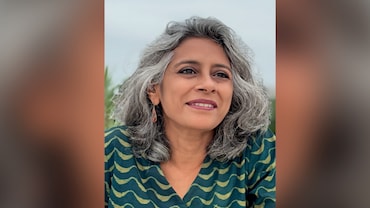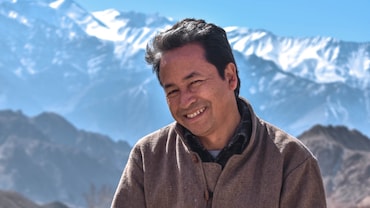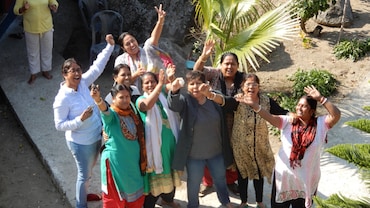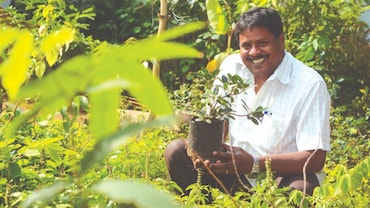- HOME
- /
- Features
- /
- Cover Story
- /
Amazing Tales Of Real-Life Heroes
Extraordinary Indians -- and how they became the defenders of the powerless

Mother Courage
Ayisha Falaq, 33
Ayisha Falaq was at a relative's place when her husband Falaq Sher Alam got the call, roughly around dinner time. Md. Akram, her husband's "muh bola bhai" had phoned to say his brother Md. Asif had been abducted. The kidnappers called from Asif's mobile, demanding a ransom of Rs 25,000 and threatening to kill him if the police were informed. Getting another desperate call around 11 p.m. they decided to go over to Akram's house. There Ayisha and Falaq, along with other family members, heard the kidnappers' demands on Akram's speakerphone. Falaq and Akram were to deliver the money and free Asif. The petite and slender Ayisha, mother of two little girls, decided she would accompany them.
Asif, 22, was an undergraduate student and drove the family sedan as a cab, part-time. On the evening of 25 May last year, he had accepted a booking. He picked up two men, Akshay* and Md. Rafiq*, from near a bank. As they approached their destination in Anand Vihar, the men instructed Asif to keep driving towards the Delhi-UP border, to Bhopura village. They had picked up alcohol en route and started drinking in the car. In an unknown area, off the main road, late in the evening, Asif was getting nervous.
Suddenly, the men grabbed him from behind and made him pull over. Beating him up, they took away his car keys, watch, wallet (which had Rs 150) and two mobile phones. They were debating whether to tie him up and kick him out, or put a bullet in his head and drive off, when Asif begged them to take his savings but let him go. Greed got the better of them. And they made the call to his family.
----
Two cars headed to the agreed spot, a petrol pump near the border -- Ayisha, Falaq and Akram in one, and Rashid, Falaq's brother in another. Plainclothesmen, who had been tipped off, followed them at a distance. Reaching the location around midnight, Falaq informed the kidnappers.
The abductors were clearly anxious and kept changing the meeting point. Once they noticed a couple of cops, they called back with more threats. Falaq reassured the thugs: They had not called the cops, they were being questioned because of the lone woman in their car. When the abductors learnt about Ayisha's presence, they demanded that she be the one to do the exchange.
New location: Bhajanpura Chowk. Falaq spotted Asif's car and pulled up behind it. He parked his car at an angle that would prevent Akshay and Rafiq from driving away. Ayisha got down with the money in her handbag and approached the car on the driver's side. The plan was to walk up to the kidnappers' vehicle, make sure Asif was safe, do the exchange and run back to the car. The kidnapper in the backseat, Akshay, rolled down the window and asked for the cash. But she demanded to see Asif first, who, it turned out, was on the floor in front. That's when the second car pulled up in front of the kidnappers' car, blocking its way.
What followed was a blaze of action. Ayisha heard the kidnappers shout "shoot her" and "let's go!" and noticed their gun. She had slipped the semi-automatic in her purse that night instinctively. Noticing Akshay cock his gun, her instinct was to defend herself. She reached for her .32 mm and fired, pointing to the floor of the car. She had the foresight not to point at anyone, though. As the kidnapper reversed the car, it hit her, throwing her off balance and causing her to misfire. Little did the goons know the five-foot-nothing, hijab-clad woman was a national-level shooter.
Asif had managed to escape in the melee. The abductors were hurt, one in the leg, the other in the hip, and were given medical treatment. A first information report was filed at the Bhajanpura police station in the wee hours of 26 May. The first two days after the incident were the most gruelling for Ayisha, a shooting coach and national-level bronze medallist. Detained at the police station for "over 30 hours and questioned non-stop", Ayisha worried about her daughters, three and eight. Her licence, gun and car were seized. At one point she thought her shooting career would be over. But that was before the world discovered her story -- of exceptional presence of mind, composure, intelligence and, of course, bravery.
The case is now on and the accused are out on bail. "Every time we went [to the police station] … we met someone from their side [kidnappers]. We were urged to talk to each other, to see if 'something' could be agreed upon. Settle, they told us, because there is nothing to this," says Falaq. But they remain unfazed and are going ahead with pressing charges of abduction.
Meanwhile, Ayisha has got her licence back along with her car, though not the gun. They have heard that her name has been nominated for a bravery award by the Delhi government. Also, she has received certifications from political leaders like Manoj Tiwari and Arvind Kejriwal. Tiwari even offered Ayisha a cash prize of Rs 10,000, which she distributed among her students.
Ayisha has continued to coach young girls in self-defence and using a gun at a police residents' welfare association, free of cost -- and is quick to remind us the values of gun safety. This gutsy woman, who picked up shooting from her husband after she became a mother in 2011, is a true hero.
-- Suchismita Ukil
Play it Forward
Akshai Abraham, 38, Project KHEL
The UN Charter declares every child has the right "to engage in play". Turns out, play is also vital for their development. Unfortunately, it's not always possible or encouraged. That's where Akshai Abraham's Project KHEL (Kids Holistic Education and Lifeskills) comes in. KHEL uses the concept of play for the development of children from underprivileged communities and runs programmes to help them become confident, self-reliant and engaged. They also learn about hygiene, leadership, teamwork and communication skills. What's more, schools have correlated the programme with improved attendance.
Abraham launched KHEL with his own savings in 2012, in Lucknow, with two rural schools and a temporary shelter for children, with two part-time facilitators. Since then, 3,500 children have benefited through the regular programme.
Growing up in a boarding school, sports had shaped Abraham's formative years. "A lot of my life lessons, coping mechanisms and love for life are rooted in sports," he says. It was during an exchange programme in Austria that he started thinking about "the idea of using sports to achieve development goals".
In 2013, the team met Deepak, a 13-year-old introverted boy from a shelter home. He had anger management issues and was a slow learner. At first, he refused to participate, watching other children play from a distance. It was at a camp in Ahmedabad that the tide began to turn. Deepak excelled in games, but shied away from performing. On the last day of the camp, when the children were invited to perform, he danced! "Initially we were worried he'd go back into his shell," says Abraham, but the programme helped him gain confidence and altered his personality. Today, he works at the shelter home he grew up in.
Children aged 8 to 19, living in slums or shelter homes are enrolled into the KHEL programmes. Some are school-going, others work to contribute to the family. The organization has eight full-time employees, seven part-time facilitators and 20 volunteers. The sessions are held in open spaces where children play and learn through football, volleyball, kho-kho, kabaddi, ultimate Frisbee and rugby. Activities such as theatre, music and dance have recently been added.
"We have seen a marked drop in verbal abuse, and improvement in self-presentation, respectful ties between children, civilities and communication, personal hygiene, academic performances and gender sensitivity," says up Abraham.
Take the case of Manavendra Singh, a fast learner. He had little patience for those who'd take time to learn, especially girls. Five months on, after becoming a peer educator, he made an effort to teach them. "Friendship and patience are his biggest learnings, things he'll follow the rest of his life," says Abraham proudly. Manavendra is now 17 and pursuing a bachelor's degree in science from Kanpur University and seeking part-time employment at KHEL.
The biggest challenge for Abraham and his team remains convincing parents. "Their understanding of the need for literacy is better than that of life skills, and they take time to trust us." Once the parents observe that their children are learning invaluable lessons during play, they allow them to continue. Other than Made in Maidaan, there are three other programmes that discuss teen issues, child abuse and menstrual hygiene. There's also one on weekend volunteering.
Says Abraham: "Every child is so much more than what they've been convinced they are, by the system and the environment. They should be safe, healthy and happy. And my hope is that they will grow up in a world free of stigma, abuse and violence."
-- Ayushi Thapliyal
Forest Warrior
Jamuna Tudu, 38, Van Suraksha Samity
A handful of Adivasi women, in tightly draped saris, march through the jungles of East Singhbhum district, in Jharkhand. Carrying pickaxes, sticks, bows and arrows, they have vowed to protect the forest from the timber mafia. Spotting a bunch of loggers, they close in on them. The men pause: They have heard of the Van Suraksha Samity (VSS), led by a group of women who are feared and revered by all. Their leader, Jamuna Tudu, aka Lady Tarzan, speaks firmly: "Stop destroying these trees. If you need firewood, pick up fallen branches. We won't let you harm the forest." The men try to argue but give up, as the green warriors leave them with no option.
Growing up in the arid badlands of Odisha's Mayurbhanj district, Jamuna had seen her father toil hard, greening their village. When Jamuna got married to Mansingh Tudu, from Muturkham in East Singhbhum in 1998, its verdant surroundings pleased her. But soon she was shocked to find the villagers habitually cut down trees for firewood.
Even though Jamuna was only 17, she knew she had to speak up. She started by talking to the women in her family about the costs of destroying the green cover. With their help, she reached out to other womenfolk. "When we called the first meeting, all the women turned up. But, no one was sure if they wanted to take on the goons," recalls Jamuna, the leader of VSS.
Jamuna got to work with just five women to keep a vigil in three shifts. Standing up to the crime was tough, given the attempts to coerce them into silence. Not relenting, they pushed back, grabbing tools, forcing offenders to pay a fine and getting them arrested. Alongside, they started the work of forestation. Slowly the word spread. That a small collective of women had taken on the timber mafia fearlessly, through peaceful means, impressed even the impassive Forest Department, which backed them. Today, 19 years later, there are 200 groups in the district, with about 30 members each, who have made sure the forest mafia is pushed back.
Covered with sal, jamun and mahua trees, the forest is truly a gift for the Adivasi people. "These trees are like brothers to me," says Jamuna. Every year, on Raksha Bandhan, they tie rakhis to the trees, celebrating the relationship between nature and humans -- each protects the other from harm, not unlike siblings. "It is the forest that has given me the strength and courage to take on powerful people," says Tudu.
Range forest officer A. K. Singh, earlier posted to the area, says, "Jamuna is brave, has the capacity to organize people, inspire them and do the right thing always." The stories of Jamuna's courage and commitment are legion. In 2007, her home was attacked by armed robbers. While physically assaulting Jamuna and her husband, the dacoits had turned to her and said, "You are flying too high, lady." In 2008, Jamuna, her husband and her associates were attacked with stones while busting a group of culprits trying to load timber on to a goods train, in the darkness of the night. She has continued her work in the face of insults, threats and assaults.
Recognition came in 2013, when Jamuna won the Godfrey Phillips Bravery Award, followed by the Stree Shakti Puraskar in 2014 and the Niti Aayog's Women Transforming India award last year. "Respect and goodwill are my greatest rewards," Jamuna says. The impact: power, water, roads and a school in their area, at last. "Today the forest is a safe haven. What's best is that people have been awakened and are standing up for what is right," she says proudly.
Jamuna does not have children; trees are her life. She and her husband often trek up the hill, into the forest, packing a little food, to enjoy its beauty and silence. "Everyone must die one day, but if I can protect the forest while I'm alive, my life will have some meaning," she says.
-- Sanghamitra Chakraborty






